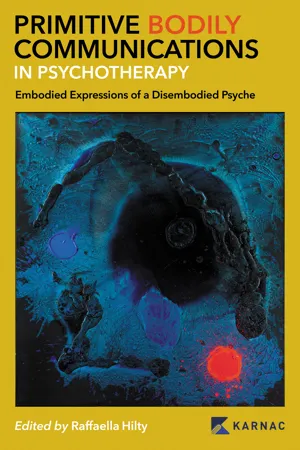
Primitive Bodily Communications in Psychotherapy
Embodied Expressions of a Disembodied Psyche
- 264 pages
- English
- ePUB (mobile friendly)
- Available on iOS & Android
Primitive Bodily Communications in Psychotherapy
Embodied Expressions of a Disembodied Psyche
About this book
Every psychotherapist will be familiar with what it means to experience the hatred and despair of their most vulnerable patients in the midst of a psychotherapy session. Most often these patients will manage to express their feelings verbally, but what about those who never developed the capacity to speak? Or those who are capable of talking, but carry a complex range of unprocessed embodied feelings that cannot be verbally expressed? Some patients must rely on another type of language in order to communicate their dissociative states of mind.
Primitive Bodily Communications explores how the 'talking cure' can still work when words fail and the body 'talks.' Non-verbal communication can be thought of as a form of body language and, even though this is a topic not frequently discussed, many practitioners have experienced working with people who communicate through the use of their bodies. The book does not refer to bodily communications as primitive because we see them as inferior to verbal language, but simply because they point to the beginnings of psychological development, to primary ways of being and relating, as well as to enduring aspects of ourselves.
The contributors explore the topic of primitive bodily communications in the context of intellectual disability, eating disorders and bodily neglect, focusing on the communicative aspect of bodily expressions within the therapeutic relationship. A wide spectrum of clinical cases illustrates how these patients can reach a state of better physical and emotional containment and, when possible, of verbal communication.
Frequently asked questions
- Essential is ideal for learners and professionals who enjoy exploring a wide range of subjects. Access the Essential Library with 800,000+ trusted titles and best-sellers across business, personal growth, and the humanities. Includes unlimited reading time and Standard Read Aloud voice.
- Complete: Perfect for advanced learners and researchers needing full, unrestricted access. Unlock 1.4M+ books across hundreds of subjects, including academic and specialized titles. The Complete Plan also includes advanced features like Premium Read Aloud and Research Assistant.
Please note we cannot support devices running on iOS 13 and Android 7 or earlier. Learn more about using the app.
Information
Table of contents
- TITLE PAGE
- CONTENTS
- ABOUT THE AUTHORS
- ACKNOWLEDGEMENTS
- FOREWORD by Susie Orbach
- USE OF TERMS
- INTRODUCTION by Raffaella Hilty
- 1: The spitting patient: speaking with sputum and free-associating with saliva
- 2: Working with primitive bodily communications in the context of unbearable trauma in non-verbal patients
- 3: The sound of silence: working with people with an intellectual disability who self-harm
- 4: Patients who smell: olfactory communication and the mephitic other
- 5: Body odour in a psychoanalytic treatment: bridge or drawbridge to a troubled past?
- 6: In corpore inventitur: embodied countertransference and the process of unconscious somatic communication
- 7: Revisiting the entropic body: when the body is the canvas
- 8: When the psyche shreds and the body takes over
- 9: Responding to trauma-based communication in psychotherapy
- REFERENCES
- INDEX
- COPYRIGHT